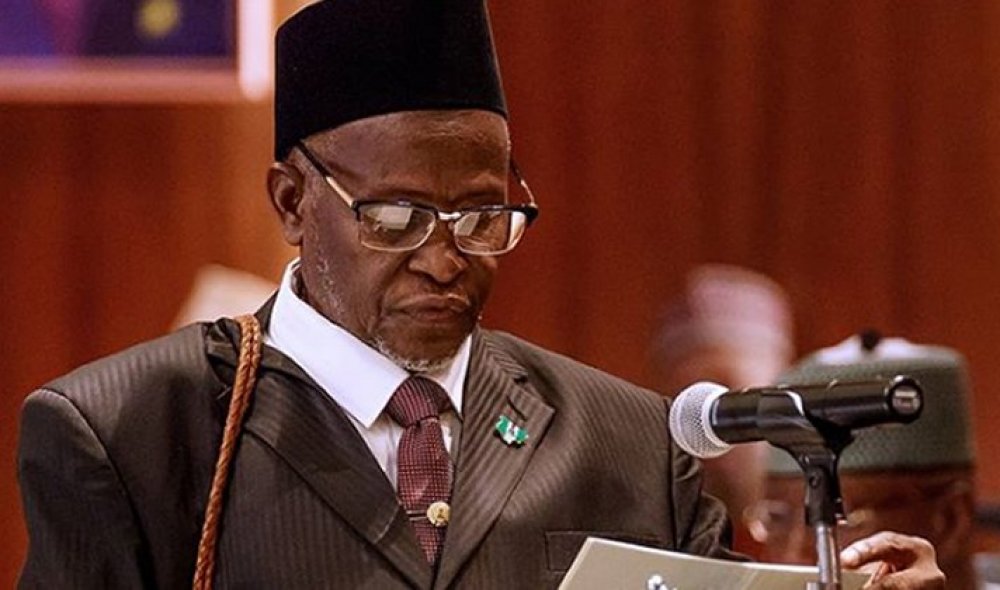
•A’Court treats 5,669 cases, SERAP seeks action on rulings
Chief Justice of Nigeria (CJN), Tanko Muhammad, has sworn in 72 new Senior Advocates of Nigeria (SANs) in Abuja.
The affected legal practitioners had been screened, examined and found worthy of the revered rank by the Legal Practitioners Privileges Committee (LPPC).
The inauguration marked the special session of the Supreme Court and commencement of the 2021/2022 Legal Year.
Muhammad, who described the ceremony as an age-long tradition, noted that the new SANs have, in all ramifications and by all standards, excelled in the practice of law.
While charging judges to undertake quick self-assessment in the line of duty, the CJN advised them to forge ahead with the right mindset and disposition to achieve more impactful results.
He said: “The Supreme Court, and by extension, the Nigerian judiciary, has fared well in the outgone legal year, though the horizon was literally roughened by overwhelming challenges.
“As this new legal year unfolds, we will like to assure you that we are determined to work assiduously to evolve a judiciary that will remarkably be the pride of Nigerians, home and abroad.”
On the invasion of Justice Mary Odili’s residence by men suspected to be security operatives, the nation’s chief judicial officer said the Bench was jolted by the invasion of her official residence, saying they have had enough dosage of such shenanigans.
He went on: “The silence of the judiciary should never be mistaken for stupidity or weakness. By the nature of our work, we are conservative, but not conquered species. We should not be pushed further than this by any individual, institution or agency of the government.”
Muhammad used the opportunity to lament the setback caused by the protracted strike of the Judiciary Staff Union of Nigeria (JUSUN), noting that it came with excruciating impact on smooth dispensation of justice.
BESIDES, the Court of Appeal said it had disposed of 5,669 cases and 10,798 motions in the outgone legal year.
Its President, Justice Monica Dongban-Mensem, said despite a 51 per cent increase in the number of motions filed during the period, the court witnessed a 48 per cent rise in the number of motions effectively handled by the panels as at November 30.
She spoke yesterday at the second retreat, yearly conference of the court and launch of its Rules 2021 in Abuja. At the event attended by the CJN, Justice Dongban-Mensem said due to the devastating effects of the COVID-19 pandemic, 528 judgments were delivered via Zoom during the period under review.
She added that 10 hearings were held using the forum, while in the last two months, 40 rulings had been delivered via the platform.
HOWEVER, the Socio-Economic Rights and Accountability Project (SERAP), yesterday, urged President Muhammadu Buhari to immediately take meaningful steps to implement several judgments obtained by it “against the Federal Government to raise money to fund the budget, reduce the growing level of borrowing and address the escalating rule of law crisis in the country.”
The organisation also implored the President to, without further delay, publicly instruct the Attorney-General of the Federation and Minister of Justice, Abubakar Malami (SAN), to ensure the “effective implementation of all of the judgments obtained by SERAP and other outstanding judgments.”
The group made the call at a media briefing in Lagos, with the theme, ‘Rule of Law Crisis: How failure of the Buhari government to enforce court judgments is contributing to grand corruption and impunity in Nigeria.’
SERAP stated: “The several judgments the Buhari administration has failed to obey are the judgment by the Economic Community of West African States (ECOWAS) Court of Justice in Abuja, which awarded N30 million as compensation for the ill-treatment of journalist Agba Jalingo, who faced trumped-up and politically-motivated charges of treason.”
It continued: “Another judgment the Buhari administration is failing to implement is the judgment by the ECOWAS Court which found the government responsible for abuses by oil companies and directed it to hold to account the companies and other perpetrators of oil pollution in the Niger Delta.”
Femi Falana (SAN), who presented SERAP Law Report to the public said: “We are surprised that the Buhari administration took a swipe at SERAP for going to court to challenge acts of corruption and official impunity. In any country that professes to practise rule of law, it is height of ‘primitivity’ for government to challenge the act of going to court by the citizens.
“This was firmly rooted in the case of Ojukwu v Gov of Lagos State which was decided during the military era. The victory over the military junta came through protests and other acts challenging official impunity in court and other lawful fora.
“It is quite ironical that those who have protested against misrule and impunity in the past are now in bed with those in government and clamp down on attempted protests by the citizens.”






